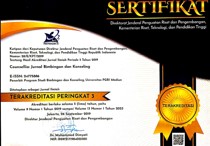Teknik Self Management untuk mengurangi perilaku terlambat datang di Sekolah
Abstract
Penelitian ini bertujuan untuk mengetahui keefektifan teknik self management untuk mengurangi perilaku terlambat datang di sekolah. Penelitian ini menggunakan pendekatan kualitatif dengan fokus penelitian perilaku terlambat datang di sekolah. Subjek penelitiannya adalah siswa kelas X SMK Negeri I Panjatan yang ditentukan menggunakan teknik purposive sampling. Ada 3 siswa sebagai subjek penelitian yang ditentukan berdasarkan frekuensi keterlambatan siswa datang di sekolah. Metode pengumpulan data yang digunakan adalah observasi, wawancara dan dokumentasi, sedangkan analisis datanya menggunakan tiga tahapan yaitu: (1) reduksi data, (2) penyajian data, (3) verifikasi atau penarikan kesimpulan. Berdasarkan hasil penelitian dapat disimpulkan bahwa ada perubahan perilaku yang ditandai dengan menurunnya perilaku terlambat siswa antara sebelum dan sesudah diberikan layanan teknik self management.
Abstract: This research aims to find out the effectiveness of self management techniques to reduce late arrival behavior at school. This study uses a qualitative approach with a focus on late-arrival behavior research in school. The research subjects were class X student of SMK Negeri I Panjatan who were determined using purposive sampling techniques. There are 3 students as research subjects that are determined based on the frequency of late students coming to school. Data collection methods used are observation, interviews and documentation, while the data analysis use three stages, namely: (1) data reduction, (2) data presentation, (3) verification or drawing conclusions. Based on the results of the study it can be concluded that there is a change in behavior marked by a decrease in late student behavior between before and after self management techniques are provided
Keywords
Full Text:
PDFReferences
Adegunju, K. A., Ola-Alani, E. K., & Agubosi, L. A. (2019). Factors Responsible for Students’ Lateness to School as Expressed by Nigerian Teachers in Elementary Schools. Mimbar Sekolah Dasar, 6(2), 185-197.
https://doi.org/10.17509/mimbar-sd.v6i2.17040
Alamri, N. (2015). Layanan Bimbingan Kelompok Dengan Teknik Self Management Untuk Mengurangi Perilaku Terlambat Masuk Sekolah (Studi Pada Siswa Kelas X SMA 1 Gebog Tahun 2014/2015). Jurnal Konseling Gusjigang, 1(1).
https://doi.org/10.24176/jkg.v1i1.259
Amin, Z. N. (2017). Portofolio Teknik-Teknik Konseling (teori dan contoh aplikasi penerapan). Unnes, May.
Bataineh, M. Z. (2014). A Review of Factors associated with Student ’s Lateness Behavior and Dealing Strategies. Journal of Education and Practice, 5(2), 1–7.
Cormier, W. H., & Cormier, L. S. (1985). Interviewing Strategies For Helpers Fundamental Skill and Behavioral Interventions.2 ed. Monterey. California: Publishing Company.
Gata, W., Grand, G., Fatmasari, R., Baharuddin, B., Patras, Y. E., Hidayat, R., Tohari, S., & Wardhani, N. K. (2019). Prediction of Teachers’ Lateness Factors Coming to School Using C4.5, Random Tree, Random Forest Algorithm. 258 (Icream 2018), 161–166.
https://doi.org/10.2991/icream-18.2019.34
Gelfand, M. J., & Jackson, J. C. (2016). From one mind to many: The emerging science of cultural norms. Current Opinion in Psychology, 8, 175–181.
https://doi.org/10.1016/j.copsyc.2015.11.002
Gie, T. L. (2000). Cara Belajar Yang Baik Bagi Mahasiswa. Yogyakarta: Gadjah Mada University Press.
Gomez, S. J. (2017). Self-Management Skills of Management Graduates. International Journal of Research in Management & Business Studies, 4(3), 40–45.
http://ijrmbs.com/vol4issue3/savilene.pdf
Kusumawide, K. T., Saputra, W. N. E., Alhadi, S., & Prasetiawan, H. (2019). Keefektifan Solution Focused Brief Counseling (SFBC) untuk menurunkan perilaku prokrastinasi akademik siswa. Counsellia: Jurnal Bimbingan Dan Konseling, 9(2), 89-102.
https://doi.org/10.25273/counsellia.v9i2.4618
Komalasari, G., Wahyuni, E., & Karsih. (2011). Teori dan Teknik Konseling. Jakarta: Indeks.
Latifah, L. (2019). Effectiveness of self management techniques to reduce truant students in middle school. Konselor, 8(1), 17.
https://doi.org/10.24036/0201981103804-0-00.
Maile, S., & Olowoyo, M. M. (2017). The Causes of Late Coming among High School Students in Soshanguve, Pretoria, South Africa. Pedagogical Research, 2(2), 1–11.
https://doi.org/10.20897/pr/80951.
Moleong, L. J. (2016). Metodologi Penelitian Kualitatif. Bandung: Remaja Rosdakarya.
Mulyani, A. (2017). Peningkatan Kehadiran Siswa kelas XI Pemasaran 2 Menggunakan Konseling Perorangan Teknik Eklektik. Jurnal Konseling Dan Pendidikan, 5(3), 167. https://doi.org/10.29210/120000
Muratama, M. S. (2018). Layanan Konseling Behavioral Teknik Self Management Untuk Meningkatkan Disiplin Dan Tanggung Jawab Belajar Siswa Di Sekolah. Nusantara of Research : Jurnal Hasil-Hasil Penelitian Universitas Nusantara PGRI Kediri, 5(1), 1–8.
https://doi.org/10.29407/nor.v5i1.11793
Nakpodia, E. D,. & Dafiaghor, F. K. (2011). Lateness: A Major Problem Confronting School Administrators in Delta State, Nigeria. International Journal of Science and Technology Education Research Vol. 2 (4), 58-61.
https://doi.org/10.5897/NGOJ11.011
Nurazmi, R., & Kurniawan, K. (2016). Meningkatkan Motivasi Berprestasi Rendah Melalui Konseling Behavior Teknik Self Management. Indonesian Journal of Guidance and Counselling 5 (4) (2016), 26-32.
Nurzaakiyah, S,. & Budiman, N. (2013). Teknik Self-Management Dalam Mereduksi Body Dysmorphic Disorder. Jurnal Psikologi Pendidikan dan Bimbingan, 13-39.
Prabowo, A. S., & Cahyawulan, W. (2016). Pendekatan Behavioral: Dua Sisi Mata Pisau. Insight: Jurnal Bimbingan Konseling, 5(1), 15-19.
https://doi.org/10.21009/insight.051.03
Prayitno, & Amti, E. (2004). Dasar-Dasar Bimbingan dan Konseling. Jakarta: Rineka Cipta.
Sa’diyah, H., Chotim, M., & Triningtyas, D.A. (2016). Penerapan Teknik Self Management Untuk Mereduksi Agresifitas Remaja. Jurnal Ilmiah Counsellia, Volume 6 No. 2, November 2016, 67 – 78.
https://doi.org/10.25273/counsellia.v6i2.1018
Sanyata, S. (2012). Teori dan Aplikasi Pendekatan Behavioristik dalam Konseling Jurnal Paradigma, No. 14 Th. VII, Juli 2012, 1–11.
Sugiyono. (2015). Metode Penelitian Kualitatif Kuantitatif dan R&D. Bandung: Alfabeta.
Suwanto, I. (2016). Konseling Behavioral Dengan Teknik Self Management Untuk Membantu Kematangan Karir Siswa SMK. JBKI (Jurnal Bimbingan Konseling Indonesia), 1(1), 1-5.
https://doi.org/10.26737/jbki.v1i1.96
Thompson, R. (2016). Counselling Techniques : Improving Relathionships with Others, Ourselves, Our Families, and Our Environment. New York: Rouledge Taylor & Francis Group.
Wahyaningrum, A., Muslim, M., & Hidayat, R. R. (2017). Teknik Self Management untuk Meningkatkan Kemandirian Belajar Siswa MTs. Consilium : Jurnal Program Studi Bimbingan Dan Konseling, 5(2), 70–73.
Walker, J., & Shea, T. M. (2010). Behavior Management a Practical Approach for Education. Columbus: Memil Publishing.
Willis, S. S. (2010). Konseling Individual : Teori dan Praktek. Bandung: Alfabeta.
Wolpe, J. (1963). Psychoterapy: The Nonscientific Hetitage and the New Science. Behav.Res
Article Metrics
Abstract has been read : 11161 timesPDF file viewed/downloaded: 0 times
DOI: http://doi.org/10.25273/counsellia.v10i1.6304
Refbacks
- There are currently no refbacks.
Counsellia is Indexed By:
Counsellia Office:
Universitas PGRI Madiun
Program Studi Bimbingan dan Konseling

This work is licensed under a Creative Commons Attribution-NonCommercial-ShareAlike 4.0 International License.














